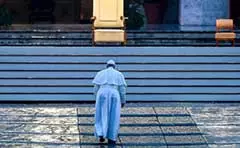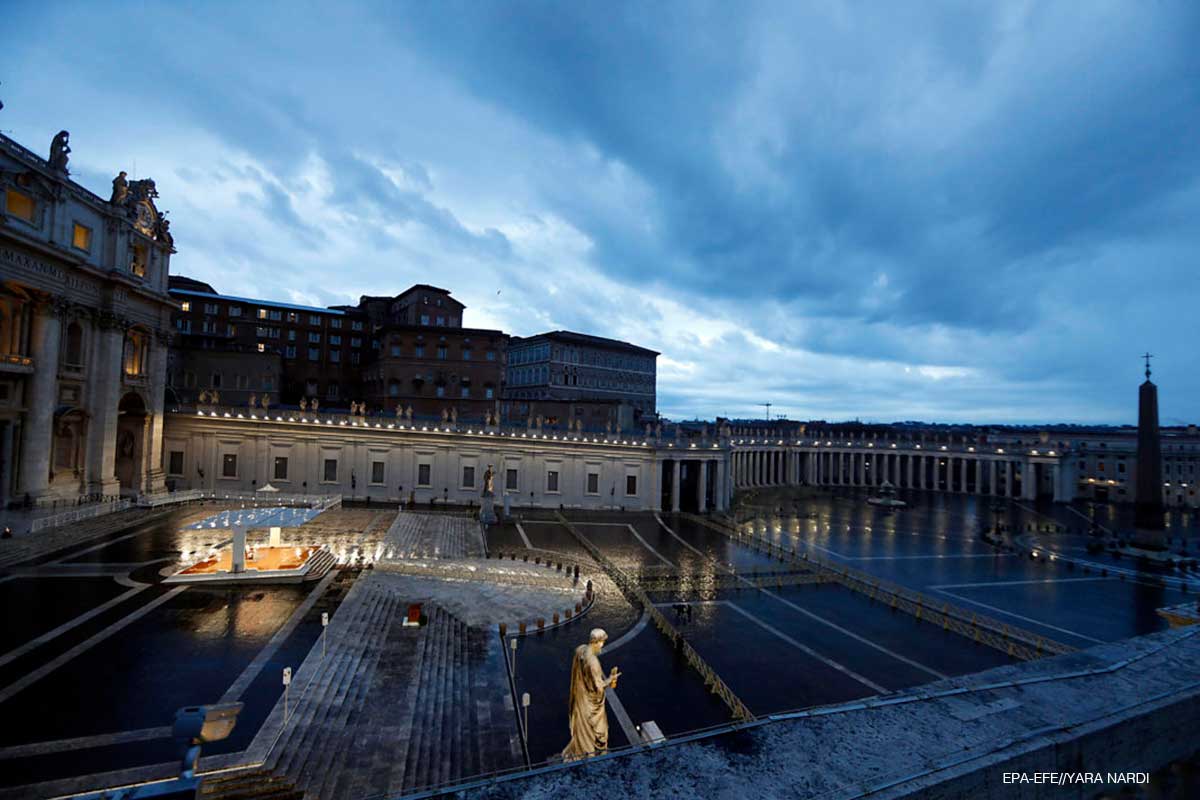
Religion, from the Latin religio -onis, akin to religare «to bind». A demanding term in times of coronavirus and social distances. In reality, the concept of religare refers to the beliefs, feelings and rites that bind an individual or a human group with what it considers sacred. And it is the link with these sentiments and values common to each creed that, even in these difficult times, guides religions to mobilize to help others.
World’s religions mobilise to help battle coronavirus pandemic
By Elena Pavlovska
April 4, 2020 — The coronavirus pandemic has altered the lives of many around the world, including millions of believers, who have seen their religious traditions upended by the outbreak. Religious communities across the globe have cancelled in-person services and put events such as weddings, baptisms, prayers, and bar mitzvahs on hold.
Most religious leaders have since shown that they are taking the outbreak seriously and have reminded worshippers to remain faithful, but to take the needed precautions to keep their communities safe and healthy.
A Catholic mass was live-streamed from Lyon’s empty Saint-Irenee church on March 24 Lyon, an event that has since been replicated across the country and in other parts of Europe.

In Italy, one of the hardest-hit countries by the coronavirus suspended all public religious meeting and the Vatican, itself, has been at the forefront when calling on its faithful to strictly adhere to the recommendations of their respective political leaders and medical experts. Catholic charities across Italy are running soup kitchens for the poor, but with modifications to prevent the virus spread.
The Church of Scientology launched an online resource centre that gives tools for efficient prevention against infection by the coronavirus. The guide is available in 17 languages and also in video format.
Though Scientology churches have closed their doors to the public, they keep servicing the needs of their community by phone and other teleworking means. Trained church volunteers are also helping their communities. In Italy, volunteers are helping elders or vulnerable people who cannot go out with food delivery at their door. In Spain, the second-worst hit country in terms of fatalities, volunteers have raised money and offered 2,000 bottles of disinfectant to the local police, 3,000 masks for homes for the elderly and hospitals, and over 1,200 personal care kits for nurses and doctors.
The upcoming Easter holidays are particularly worrying as both Western and Eastern Christian churches practice the rite of communion. During Holy Week, which precedes Easter, many churches traditionally wash parishioners’ feet to replicate a moment from the Bible. Communion is a particularly concerning ritual, as it involves long lines of people eating from the same loaf of bread and drinking wine from the same cup.
In the United States, many churches have not taken any measures, but some Protestant denominations have followed the lead of the Catholic church and have banned drinking from the same cup and discouraged handshaking.
In Austin, Texas, leaders of the Central Christian Church, a North American Protestant denomination which is part of the Disciples of Christ, are having its ministers wear plastic gloves while handing out communion. The Trinity Lutheran Church of Manhattan told its worshippers to avoid the traditional dipping of bread into wine.
Catholic archbishops of Chicago and New York indefinitely cancelled all masses on March 14, while St. Andrew’s Episcopal Church in Pennsylvania has been releasing all of its religious services online, as well as many secular activities, including yoga and poetry readings.
Churches in densely populated areas in the US are already ramping up ways to hold their communities together through Facetime, Google, Zoom, and Facebook Live.
Some church leaders, however, have continued in-person services. In Washington, DC, a rector tested positive after performing communion at an Episcopalian church with more than five hundred congregants.
Christians, Muslims, Jews, and other worshippers have continued to pray for an end to the coronavirus pandemic, sometimes by violating the lockdowns imposed by the governments.
Israeli security forces were forced to arrest ultra-Orthodox Jews after the community violated Israel’s strict quarantine by gathering in a synagogue in Jerusalem. Infection rates in ultra-Orthodox communities have been higher than the rest of the country and members of the community could be seen in recent days outside closed synagogues while keeping a distance of two metres from one another.
The Israeli media reported that more than a third of the total population of Haredis, or ultra-Orthodox, in the city of Bnei Brak is estimated to have COVID-19. Israel has imposed some of the world’s tightest restrictions to contain the disease, imposing a two-week quarantine on all travellers entering the country, almost stopping tourism and limiting public gatherings.
Many countries in the Middle East have imposed tough restrictions to curb the spread of the pandemic. Many Muslims are torn between the need to apply social distancing and the need to be close to family and relatives, as the Koran teaches them.
Iran banned Friday prayers on March 4. Turkey and Indonesia tried to continue Friday prayers with social distancing but found that the risk was too high and soon the entire Muslim world closed mosques for prayers.
Saudi Arabia banned foreign arrivals and halted visits to Mecca and Medina and suspended entry to all Iranians and all other pilgrims on February 27.
Across South Asia, Buddhist New Year celebrations, which often bring thousands of people together for public water fights and other events, have also been cancelled.
Concerns remain about government measures during a series of upcoming major religious holidays, including Easter, Passover, and Ramadan, which occur within weeks of each other in April.
Source: NewEurope





